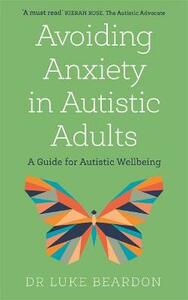Take a photo of a barcode or cover
Sadly very basic knowledge of your environment affects how your anxiety manifests with no steps on how to change your environment for the better. If you're just started on your autistic journey maybe this will be helpful to you but I was sadly disappointed by how its stated it's on society to change with no talk of how to mitigate the anxiety in the meantime.
It took me two months to read this because I had an overwhelming emotional reaction to it - in a positive way. "To live with constant anxiety is a misery that no one should have to endure."
This book asked me to acknowledge and identify anxieties that I've dismissed and masked my whole life, then asked the world to do better. This book told me that my anxieties are allowed to exist, and then told the world to make reasonable adjustments to ease my, and every other autistic persons, anxiety.
This book didn't tell me to 'go do X, Y, Z and then you'll be cured of anxiety'. This book did tell me that 'of course you're suffering from crippling anxiety!! Most environments you are in are actively harming you! and it is not solely your responsibility to change that'. Then it when on to educate and provide guidance on how everyone can work to make the world are safer place for autistic people.
Thank you to Dr Luke Beardon.
This book asked me to acknowledge and identify anxieties that I've dismissed and masked my whole life, then asked the world to do better. This book told me that my anxieties are allowed to exist, and then told the world to make reasonable adjustments to ease my, and every other autistic persons, anxiety.
This book didn't tell me to 'go do X, Y, Z and then you'll be cured of anxiety'. This book did tell me that 'of course you're suffering from crippling anxiety!! Most environments you are in are actively harming you! and it is not solely your responsibility to change that'. Then it when on to educate and provide guidance on how everyone can work to make the world are safer place for autistic people.
Thank you to Dr Luke Beardon.
Bizarre book - I personally didn’t find it very useful and it was a bit broad and vague plus the tone /voice felt weird …
As someone officially diagnosed with general anxiety disorder and autism, I can say this is one of the most validating books on autism I have read to date, and not just because it validates the specific anxiety experienced commonly by autistic folks. So many autism resources not written by autistic people (Beardon is not himself autistic) frame things as autism being a disorder, a deficit, a challenge to be overcome, etc, and Beardon is very up front with his belief that it is simply a different neurotype, not a lesser-anything.
He is the only non-autistic author I have read so far that is so compassionate towards and understanding of the autistic experience, and striving so hard to be inclusive to autistic people within his own work but also in making suggestions for workplaces, schools, etc, to reduce the anxiety of autistic people. The book is actually less aimed at the anxious autistic person and more at the people who interact with them. He gives many descriptive experiences in an effort to get the PNT/'neurotypical' person to understand better what the autistic experience is like when it is something a PNT will never experience for themselves.
There are chapters on university, work, relationships, specific triggers and how they can cause anxiety, etc. I only give this book 4 stars because a) as someone who finished school several years ago and who is on the aroace spectrum, select sections are not relevant to me, and those that are are things I am familiar with through my own research and reading; and b) the later chapters are geared more towards the coworkers, bosses, teachers, etc, who would deal with the autistic person. While I do agree with Beardon that the reason we are anxious is not because we are autistic but because we are forced to pretend to be neurotypical, and therefore it is not us that needs to change but other people and the institutions PNT people are part of, it makes this book, for me as the anxious autistic, a bit less useful. It's a book that, having read it myself, would be good to hand out to the people around me so they understand me better and can accommodate me from a more informed and less bigoted position. Quite honestly, it was the first few chapters that were the most useful to me because it lists all kinds of triggers I didn't know about because I don't personally have them, explains these triggers in a way that makes sense to me, and simply lends an understanding ear to the autistic experience. I felt so <i>seen</i> in a way that even the psychologist diagnosing me with autism didn't do.
He is the only non-autistic author I have read so far that is so compassionate towards and understanding of the autistic experience, and striving so hard to be inclusive to autistic people within his own work but also in making suggestions for workplaces, schools, etc, to reduce the anxiety of autistic people. The book is actually less aimed at the anxious autistic person and more at the people who interact with them. He gives many descriptive experiences in an effort to get the PNT/'neurotypical' person to understand better what the autistic experience is like when it is something a PNT will never experience for themselves.
There are chapters on university, work, relationships, specific triggers and how they can cause anxiety, etc. I only give this book 4 stars because a) as someone who finished school several years ago and who is on the aroace spectrum, select sections are not relevant to me, and those that are are things I am familiar with through my own research and reading; and b) the later chapters are geared more towards the coworkers, bosses, teachers, etc, who would deal with the autistic person. While I do agree with Beardon that the reason we are anxious is not because we are autistic but because we are forced to pretend to be neurotypical, and therefore it is not us that needs to change but other people and the institutions PNT people are part of, it makes this book, for me as the anxious autistic, a bit less useful. It's a book that, having read it myself, would be good to hand out to the people around me so they understand me better and can accommodate me from a more informed and less bigoted position. Quite honestly, it was the first few chapters that were the most useful to me because it lists all kinds of triggers I didn't know about because I don't personally have them, explains these triggers in a way that makes sense to me, and simply lends an understanding ear to the autistic experience. I felt so <i>seen</i> in a way that even the psychologist diagnosing me with autism didn't do.
informative
fast-paced
emotional
hopeful
informative
inspiring
lighthearted
sad
fast-paced
hopeful
informative
inspiring
medium-paced
hopeful
informative
reflective
fast-paced
This book is excellent and so helpful. It is really informative and reading it feels like a casual discussion with the author. Some sections aren't applicable to me (e.g. university), but as a whole this is such a good resource and I'll be recommending it to other autistic people in my life.
I highlighted many parts of this book.
I highlighted many parts of this book.





